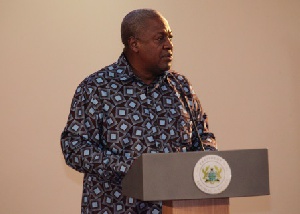President John Dramani Mahama on Saturday called on the Ghana Journalists Association and the National Media Commission to introduce measures that would regulate the contents of media outlets especially broadcast media.
He said Ghana is part of the global world and therefore could no longer hold whatever contents that were reported in their outlets exclusively.
"We must realize that whatever we report in Ghana is no longer for the local audience alone, but for the international audience as well."
President Mahama made this call when he addressed the 20th Ghana Journalists Association Awards night on the theme: "Ghana in search of reliable energy to power development: The role of the Media."
The programme, which saw Seth Kwame Boateng of Multimedia emerging the 'Journalist of the year', was also attended by Journalists from within and beyond, Ministers of state, the Clergy and other patrons.
He explained that with the introduction of social media over the years, a lot falsehood and half-truths had been spewed into the system, creating false impressions, which could have negative repercussions on the country.
President Mahama said investors and other business communities read a lot about countries before embarking on their journeys to those countries and if such negative perceptions are allowed to flourish, it could become inimical to the country's economy.
He said recently there was a story making the rounds in some media outlets and social media that Ghana was the 10th dirtiest country in the world, but rigorous checks have revealed that the story had no source and therefore was not true.
The President said Ghana's democracy was strong because of the vibrant media and therefore the publication and broadcast of half-truths could cast a slur on the Ghanaian media and the country in general.
He appealed to managements of various media houses to employ Journalists with professional training and offer in-service training programmes for their staff to be on top of issues.
On the energy problem, which had compelled the country to experience load-shedding, President Mahama said his administration would find a permanent solution to the challenges.
He said although, previous administrations had faced similar challenges, no permanent solutions were found, a situation he said, had aggravated the current challenges.
President Mahama gave the assurance that a total of 1,800 megawatts of power would be added after the completion of numerous power projects under construction in both the Western and Greater Accra regions.
He however cautioned that government and independent power producers would monitor and track down all illegal power users, who would either be prosecuted or be made to pay for the illegal power they have enjoyed over the years.
"We cannot continue with the illegal power and theft that is currently going on in some parts of the country."
He called for the partnership of the media in educating the public on their responsibilities in the use of power and that of the reforms government would carry out to ensure efficiency in the value chain.
The President promised to restructure the media development fund to ensure that all media houses accessed it to improve standards in the coming years.
Mr Roland Affail Monney, President of the Ghana Journalists Association said the Association, in collaboration with the Frederich Ebert Foundation, was in the process of reviewing the ethics of Journalists to ensure that practitioners operated within the confines of the laws of the profession.
He gave the assurance that the Press Centre redevelopment programme would soon resume to complete more projects at the centre.
Mr Monney said the heightened power fluctuation in the country has had negative repercussions on media houses, as they had to resort to other expensive alternative sources of power to accomplish their responsibilities and called on government to address the deficit.
Click to view details



General News of Monday, 17 August 2015
Source: GNA

















